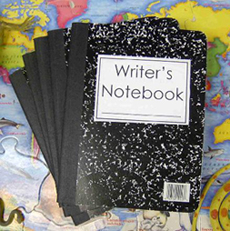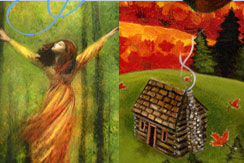| |

ABOUT THE AUTHOR
by Virginia Frances Schwartz
 |
|
I knew
I wanted to be a writer by the time I went to school. School gave
me the written word. But, long before that, the environment I was
raised in prepared me to write. It provided me with certain qualities:
beauty; space; endless time to daydream; storytelling; and access
to books.
I
grew up in Canada in the heart of the fruit belt that stretched
across Southern Ontario from Niagara Falls to Toronto. When I was
young, it was completely rural, “like a slice of heaven”
as my grandfather says in my latest novel about my family, Messenger.
My backyard was a 20 acre orchard of blossoming fruit trees where
I played, daydreamed and read. My mind traveled to a million places
as I dangled upside down, played dressup and spent every moment
I could, even throughout the long snowy winters, outside. Beauty
and space were essential for me to become a writer.
|
| Storytelling
was the fuel. Reading provided the fire. By sheer luck, the one library
in the whole county was built a block away from my house. I had a
new place to explore then. When I read everything in the juvenile
section, the librarian secretly allowed me access to that intermediary
section, on a landing between the kids’ books in the basement
and the real adult books on the sunny upper floor. This was “young
adult”, for teenagers, a collection of historical fiction and
mysteries that fed my imagination. I had reached a new land and the
best part was getting there while I was still a fourth grader. |
| Although
I did write as a child, I did not take writing all that seriously.
Perhaps that was because it came easily to me to write the required
essays and assignments. But I didn’t venture out on my own much.
The stories were still locked in my head. It wasn’t until I
was an adult that I could finally focus on writing. I began my career
teaching in the fourth and fifth grades. I loved teaching writing
and reading the most. I used to say to my fellow teachers, “If
only I could just teach writing all day!” My wish came true.
I was sent by my district to Columbia University to be trained as
a teacher of The Writing Process. Each day, I visited classrooms to
inspire and train young writers from kindergarten to grade six. Side
by side with the children, we read great stories from Cynthia Rylant,
Gary Paulsen, Eloise Greenfield and Donald Crews. We wrote in writer’s
notebooks every day and learned the steps of drafting, revision, editing
and proofreading. You can’t imagine how lucky I felt working
each day to transform children into writers. It fed something deep
inside. I felt as if I was facing the child in me who dreamed of becoming
a writer but had no idea how to do it. It was during my tenure as
a writing teacher that my first book was accepted for publication. |
|
 |
| My
subject is always historical fiction for Young Adults although I hope
to write for middle graders soon. In life, I always root for the “underdog”,
the one who is left behind in some way, the one I recognize as having
so much potential that is covered or perhaps crushed. They often sat
in my classroom. Girls so shy, they never looked up. Boys who stuttered.
New immigrants lost without the words and friendships to make them
feel at home. Kids who stumbled over math. Students who at eight years
of age, had dark worry circles beneath their eyes. I wanted them to
succeed and realize the tremendous power they had waiting inside of
them. I wanted the other children to learn tolerance, to know that
others can be different from you on the outside but that inside, we
are all the same. It is no surprise to me that I write about slaves,
immigrants and Native Americans. These groups suffered tremendous
hardships and injustices. In my novels, I give them hope and a different
life. |
| |


|
One
of the ways in which I have dealt with suffering in my own life was
developing into a spiritual person. That means that I look to a higher
place than just my own mind for everyday guidance. The songs and prayers
of the slaves in Send One Angel Down and If I Just Had Two Wings mirror
the spiritual belief that helped slaves endure centuries of degradations.
In Messenger, the fatherless narrator is soothed by prayer, literature,
poetry and a belief in the afterlife. These books explore ways to
nourish a spirit that has been crushed by abuse and overwhelming family
or social problems. Spirituality, or thinking about God, helps us
to recognize our true self and develop our potential. |
|
As
a writer, I sit down at my desk, or lie in a field studying clouds
in the sky, and listen carefully to the words in my head, the same
way I did as a child. I try to get them down as fast as I can at
first and do a lot of revision later. The words often come in a
rush and my hand moves so fast, it hurts. I keep a notebook by my
bedside because ideas often come just before I fall asleep. My characters
seem to find me. I did not decide, for instance, to write about
slavery. But the ideas were in the air. Here’s what happened.
|
| I
had been teaching Social Studies to fourth graders who yawned through
my lessons. They didn’t get it! So I researched and presented
them with poems, stories and graphic examples of the lives of slaves.
We read Julius Lester’s “To Be A Slave”, sat in
a circle and discussed it. Now there were questions and tears. We
acted out Eloise Grrenfield’s poem “Harriet Tubman”
as a play following her escape to Canada. Now there was joy and clapping.
We listened to recorded voices of the slaves from the Federal Writer’s
Archives. Now there was great awe and the children responded with
letters and poems about the slaves. |
|
 |
 |
|
One
evening, after school ended and I had just finished reading Alex Haley’s
“A Different Kind of Christmas”, I could not fall asleep.
My heart actually hurt. I had trouble breathing. I felt angry. Why
did others allow slavery to happen? What would I have done to help?
It was after midnight and my mind was churning. Suddenly, a girl’s
face appeared in my mind. She was thin, black, and tortured looking.
At once I knew she was a slave. What drew me into her was her extreme
pain and urgency. She had a story to tell. All I had to do was listen.
Many times before this had happened, but I listened as I lay down
and always fell asleep. This time was different. I got up, went into
another room, grabbed some paper and wrote down all her words. I had
never written a book before, but the next morning when I looked at
what I wrote, I realized it was the first two chapters of a novel.
That character was Phoebe and her story became If I Just Had Two Wings.
Those words did not change throughout all the edits. That experience
made me into a writer and taught me how to access the words, how to
mine my feelings and always, always to get the words down, however
and whenever they appear. |
Slavery is
obviously something that needs to be talked about in the new millennium.
America needs racial healing.
What I realize
is that to be a childrens’ author today is to take responsibility
for the ways in which children think and grow. I’d like to help
make the world a healing place for all races, religions and cultures.
Transatlantic Agency Bio: https://transatlanticagency.com/clients/authors/virginia-frances-schwartz/
|
|





